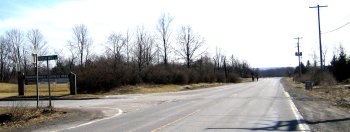- By Dan Veaner
- News
 Print
Print  On July 6, 2007 an ambitious Lansing sewer project bit the dust when Town Board members decided to stop pursuing it because of excessive cost. The plan would have required laying an expensive and unpopular trunk line through the Village of Lansing to connect the Town sewer to a shared processing plant in Cayuga Heights. Wednesday night Lansing Engineering and Planning Coordinator Jeff Overstrom told the Town Board that he has received verbal approval from the DEC (New York Department of Environmental Conservation) for a more modest proposal.
On July 6, 2007 an ambitious Lansing sewer project bit the dust when Town Board members decided to stop pursuing it because of excessive cost. The plan would have required laying an expensive and unpopular trunk line through the Village of Lansing to connect the Town sewer to a shared processing plant in Cayuga Heights. Wednesday night Lansing Engineering and Planning Coordinator Jeff Overstrom told the Town Board that he has received verbal approval from the DEC (New York Department of Environmental Conservation) for a more modest proposal."I did receive initial verbal positive feedback from DEC Tuesday, stating that they like this plan," Overstrom said. "They think that it's feasible and reasonable. This could be a plan that we could move on."
When the earlier plan was abandoned the DEC insisted that Lansing be part of a six-community consortium that would use a shared sewage treatment plant to reduce the outflow of material into Lake Cayuga. But late last year DEC changed its position, telling town officials that they might consider a more economical plan that includes a stand-alone plant.
Overstrom condensed and updated a plan developed by engineering firm TG Miller to craft a feasibility study for a new project. The proposed service area includes the South Lansing area where plans for a future town center are focussed. To the west the area includes Myers Park and covers 34B (Ridge Road) as far as the Lansing school campus. To the west the district goes part way up Auburn Road (Rt. 34) as far as the Finger Lakes Residential Center (the boy's youth incarceration center), and across the street to cover the Kingdom Farm area. The treatment plant is proposed to be placed near Cargill, just south of the Ladoga Park neighborhood, which has been in severe need of sewer for a long time because of flooding in the lakeside neighborhood.
Town Supervisor Scott Pinney says that bringing sewer to the incarceration facilities could encourage state funding, because the facilities are owned and run by the state. Currently the facilities use a 20 year old package plant which they must maintain themselves. Hooking up to municipal sewer would save the state replacement and maintenance costs in the long run.
The $18 million project that was killed in 2007 had two unpopular aspects: the cost to people in the sewer district who did hook up to the sewer would be too high, and people in the district who would not be given the opportunity to hook up would still pay, even if they realistically never got sewer on their street.
Cost will still be an issue for the new plan. Overstrom says that DEC officials expressed concerns about the cost of the project, and the availability of monies that might have been available a few years ago but will not be now. But Pinney says that if the town prepares a 'shovel-ready' project new funds may be available. Deputy Supervisor Connie Wilcox agreed.
"There may not be the funding available that was there before," she said. "With all this federal stimulus money for infrastructure it seems as if there should be something out there that we could apply for."
Pinney praised Overstrom for his work on the study.
"That was a huge step to get the feasibility study approved that quickly," he said. "A lot of that money was spent on it in the late '90s. Jeff spent a lot of time on it, but it was all in-house time to revise it to today's standards."
Pinney says the next steps are to get the DEC's approval in writing before going to the next step. He said the town should ask TG Miller for an estimate on what it would cost to develop the numbers showing the actual cost of the project and the cost-per-EDU. He proposed sending copies of the feasibility study to State Senator Michael Nozzolio and U.S. Congressman Michael Arcuri to get their input on possible sources of infrastructure funding.
Pinney also reported that USDA Rural Development has backed out of a promise to provide funding for the Warren Road sewer project. That project proposes to bring sewer up from the Village of Lansing to just beyond the Warren Road Business Park. The project was initially proposed by Transonic Systems, which found it could not feasibly expand its Lansing plant without municipal sewer. The sewer could make the difference between creating new, well paying jobs in Lansing, or losing 100 existing jobs.

The Warren Road sewer will come to just north of the Warren Road
Business Park, as far as the Springbrook Apartments
Pinney said that Rural Development ruled in December that they would not fund projects in towns with more than 10,000 residents. He said 11 towns across New york State have been impacted, some losing their projects entirely. But he added that almost $2 million of DEC money has been approved for the project, and that if the town accepts that money it would no longer be eligible for the Rural Development money even if it were still offered.
"This is a project that we've been working on for two years," Pinney said. "I talked to another town supervisor with the same problem. They are ready to go out for bid and they have no other funding, so their project is done. They spent a lot of money on it. Fortunately we have funding from the DEC for $1.9 million. We were protected and it didn't cost us the whole project. We're very fortunate that we're still able to move forward."
That will certainly impact the new sewer project. Rural Development money was to help fund parts of the larger project that failed, but won't be available to Lansing now.
Pinney says the Warren Road project will go out for bid over the next couple of weeks. Lansing Highway Superintendent Jack French says that Warren Road will be closed for two months between Hillcrest and Asbury Roads while Tompkins County's Warren Road reconstruction project is completed. He says that truck traffic will be routed along Triphammer Road, but that a lot of automobile traffic can be expected along Hillcrest Road.
French says that the two projects are not coordinated, and that the town will have to repair intersections after installing sewer pipes.
----
v6i15



